
The German wine classification system puts a strong emphasis on standardization and factual completeness, and was first implemented by the German Wine Law of 1971. Nearly all of Germany's vineyards are delineated and registered as one of approximately 2,600 Einzellagen, and the produce from any vineyard can be used to make German wine at any quality level, as long as the must weight of the grapes reaches the designated minimum level. As the current German system does not classify vineyards by quality, the measure of wine ’quality’ is the ripeness of the grapes alone.
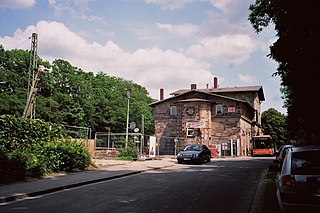
Witzenhausen is a small town in the Werra-Meißner-Kreis in northeastern Hesse, Germany.

The Lakenvelder or Lakenfelder is a breed of domestic chicken from the Nordrhein-Westfalen area of Germany and neighbouring areas of the Netherlands. It was first recorded in 1727.

Weinolsheim is an Ortsgemeinde – a municipality belonging to a Verbandsgemeinde, a kind of collective municipality – in the Mainz-Bingen district in Rhineland-Palatinate, Germany.
Ann C. Noble is a sensory chemist and retired professor from the University of California, Davis. During her time at the UC Davis Department of Viticulture and Enology, Noble invented the "Aroma Wheel" which is credited with enhancing the public understanding of wine tasting and terminology. At the time of her hiring at UC Davis in 1974, Noble was the first woman hired as a faculty member of the Viticulture department. Noble retired from Davis in 2002 and in 2003 was named Emeritus Professor of Enology. Since retirement she has participated as a judge in the San Francisco Chronicle Wine Competition.
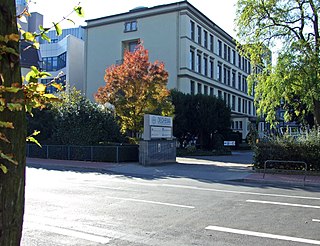
DECHEMA is an abbreviation for "Deutsche Gesellschaft für chemisches Apparatewesen", though it has since been expanded to "Deutsche Gesellschaft für Chemische Technik und Biotechnologie".
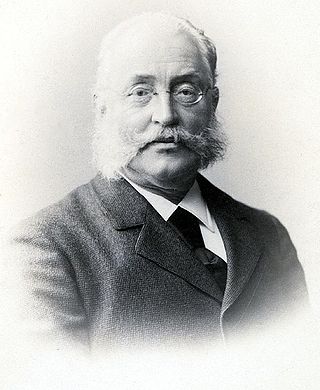
Max Eyth was a German engineer and writer.
Food or drink competitions reward products primarily for their "gustative worth" in the form of an award or a medal. These competitions can be classified into different categories, and most awards are product-specific, such as for wines, beers, and cheeses. Others focus on local, regional and/or national products. Finally, the international competitions test all kinds of foods and drinks available to consumers on a retail basis. Wine is probably the most tested drink, followed by beer and spirits.
Vivani Organic Chocolate is a brand of chocolate created by EcoFinia GmbH, a subsidiary of Ludwig Weinrich GmbH & Co. KG., based in Herford, Germany. First introduced in 2000 at the international organic food fair, BioFach, Vivani chocolate is predominantly sold in organic supermarkets and shops, where it claims market leadership in organic chocolate bars.

The Bergische Kräher is a German breed of domestic chicken from the Bergisches Land, in the state of North Rhine-Westphalia in western Germany. It is named for its unusually long crow, up to five times as long as that of other breeds, and belongs to the group of long-crowing chicken breeds, which are found from south-east Europe to the Far East.
With a growing number of offerings, such as those produced by an increasing number of microdistilleries, various mechanisms have arisen to provide reviews and opinions of individual varieties of spirits. These events generally use expert panels and blind tastings within specific categories to provide opinions and ratings.
Anuga FoodTec is a trade fair for the food and beverage industry. It covers aspects of food production including process technology, filling and packaging technology, packaging materials, ingredients, food safety, and food production. It is structured into eight product segments: food processing, food packaging, safety and analytics, digitalization, automation, intralogistics, environment and energy, science and pioneering.
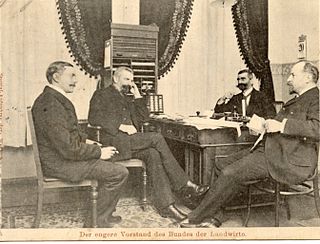
The Bund der Landwirte (BDL) was a German advocacy group founded 18 February 1893 by farmers and agricultural interests in response to the farm crisis of the 1890s, and more specifically the result of the protests against the low-tariff policies of Chancellor Leo von Caprivi, including his free trade policies.
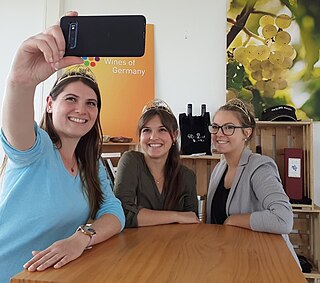
The German Wine Queen is the representative of the German wine industry. The Wine Queen is supported by two princesses, forming together the German Wine Ambassadors. She is elected, usually in the Palatine town of Neustadt an der Weinstraße, for a period of one year. The title is competed for by the regional wine queens of the thirteen German wine regions producing "quality" wine.

The Rotes Höhenvieh is a breed of red cattle from the Central Uplands of Germany. It was created in 1985 as a merger of the few remaining examples of a number of closely similar regional breeds of upland red cattle. Reconstruction of the breed was made possible by the discovery of a stock of semen in a sperm bank. The name means "red upland cattle".

IFIS is an academic publishing company and not-for-profit organisation operating in the sciences of food and health.

The Augsburger is an endangered German breed of domestic chicken. It originates from the area of the city of Augsburg, in the Swabian region of the state of Bavaria, in southern Germany. It was bred in the nineteenth century, and derives mostly from the French La Flèche breed. It is the only chicken breed of Bavarian origin.

The German Pekin, German: Deutsche Pekingente, is a European breed of domestic duck. It is commonly called simply Pekin or White Pekin. It is a different breed from the American Pekin, which is also commonly known by the same names. It was bred in Europe from birds originating in China and Japan and is distributed in many European countries.

The German Classic Pony or German: Deutsches Classic Pony is a modern German breed of riding pony. It derives from the traditional Shetland Pony of the Scottish Shetland Isles, but is principally influenced by the taller and more elegant American Shetland Pony.















